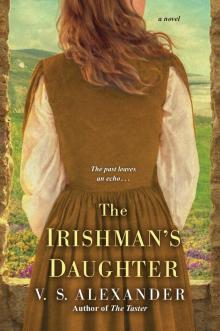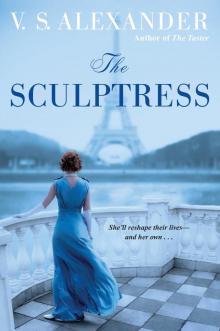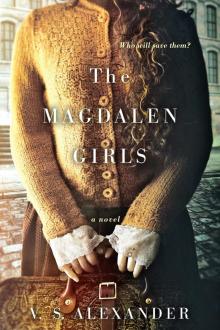- Home
- V. S. Alexander
The Irishman's Daughter Page 12
The Irishman's Daughter Read online
Page 12
Again, he looked for an explanation.
She hadn’t had time to tell him of her plan to feed the starving. “We’re feeding the people tonight, as many as we can. I plan on making soup. Father is checking on the stores now.”
“You are a wonder.” Pulling her close, he kissed her.
Cherishing the press of his lips upon hers, she deepened the kiss, not caring who saw them—be it her father, Lucinda, the poet, or the priest. It didn’t matter. She settled against his strong chest, smelling the Irish earth upon his body. In that moment, she loved his strength, his determination to do right, his unwavering loyalty and love for his family and her—all the characteristics that had bound her to him from the beginning—though it had taken her years to define those feelings. His love would guarantee a home no matter where they lived. She sensed that more than ever now that danger loomed over them.
The famine was not far behind, riding a pale horse that galloped toward her. The imminent danger strengthened her dreams and desire. After everyone had been fed tonight, she would ask Rory to marry her. She had never been so sure of anything in her life.
* * *
Her father tapped pen against the paper while tallying up the list. Briana and Lucinda sat on the edge of their seats awaiting the results.
“I’ve made the count,” he began. “We have enough to feed the people here for three days if we use supplies sparingly. I’ll send Rory to Belmullet tomorrow in the hope that he can secure enough meal to hold us for a few more weeks. After that, we’ll have to think of something else.”
Lucinda frowned and breathed deeply before her words spewed out in English. “Am I the only one in this house who isn’t mad?” She thrust out her hands in frustration. “Have either of you thought of the consequences of this ridiculous action? What happens when Sir Thomas finds out that none of our tenants can pay the rent, yet we are feeding strangers from our supplies? How do you think he will react when he arrives at Lear House next month and finds there is no food to eat? Shall we have him eat cake?” She placed her hand on her chin in a thoughtful pose. “What will happen when the word spreads and hundreds more starving people flock to Lear House to be fed? Have you considered the consequences of such an action? We will be overrun with no food to give, and Lear House will be burned to the ground and the nearest tree will be our gallows . . . as the note says.”
“I hardly think it will come to that, sister,” Briana said. “If you had seen the people for yourself—if you had seen that child die in his mother’s arms. Where’s your heart?”
“My heart is here with my family, but I also seem to be the only one with a practical head. I’ve dispatched the letter to Sir Thomas, and we need to wait for his reply.” She shot a defiant look at her father. “Frankly, I’m disappointed in you.”
“No need to sharpen your tongue on me,” Brian responded.
Stung by her father’s words, Lucinda recoiled in her chair. “I shan’t listen to such nonsense, and I’ll take no part in the ‘serving’ this evening.”
“Lucinda, see reason,” Briana begged, thinking a show of kindness might sway her sister. “We need your help.”
“It would be wise to aid your sister,” Brian scolded.
“And if I don’t?”
“Remember that you, despite your age, still live under my roof.”
“Under the kindness and the employ of Sir Thomas, we all live here,” Lucinda countered. “So far, I’ve only asked that he take pity on the tenants and us. He might like to know what liberties are being taken at Lear House.”
“You wouldn’t,” Briana said, shocked at her sister’s effrontery.
“It doesn’t matter.” Her father closed the ledger and tapped it with his forefinger. “By the time your letter gets to the landlord, the deed will have been done—long over—and, despite your protests, I really don’t think you want us to be driven from the estate.”
Lucinda stood, ready to walk out the door.
“Do you, daughter?” Brian prodded.
A small breath escaped from her mouth before she answered. “Of course not.”
“Good.” He pointed toward the kitchen. “We have a lot to do before we feed our people. Let’s get started?”
Lucinda stopped at the library door. She looked uncertain whether to go with them or return to the cottage and bury herself in a book. Briana grabbed her sister’s hand and pulled her down the hall.
* * *
Three hours had passed before the two steaming cauldrons of frothy oat soup were ready to eat. Rory, Jarlath, and some of the other tenants added carrots and dandelion leaves. Briana tasted the hot liquid, which reminded her of thin oatmeal mixed with vegetables—the brown broth wasn’t pleasant to look at, but it was nutritious and hot.
Grateful that the rain had stopped, Briana eyed the sky, which churned with clouds as dark as raven’s wings. Her father had set two torches at the back of the house for light, adding to that from the fires under the pots. The moaning wind and the flickering shadows cast an eerie pall over the evening. Many who ambled down the lane to Lear House resembled skeletons, with brittle bones showing under desiccated skin.
Lucinda handed bowls to the people. Brian ladled the soup, and Briana handed them a thin slice of bread. Sitting or standing, the starving ate on the wet heath behind the house. When the bowls came back, Briana washed them and returned them to Lucinda to give to the next in line.
Most said little while they ate, but some spoke in raspy whispers and told her father of others not strong enough to walk. Briana sent Daniel Quinn to deliver soup and bread to those suffering on the side of the road. Father O’Kirwin had priestly duties to administer and went about his business after eating.
Rory returned with the family whom he had given shelter. They had traveled on foot from Belderrig to the east. “We heard that Lear House might have food,” the man told Briana as he leaned against his wife for support. Briana welcomed them, amazed that word had traveled so far.
Connor Donlon and his oldest son showed up near eight-thirty. Most people had been fed and the cauldrons were nearly empty. She took pride in knowing she and her family had helped as best they could. As she dipped a bowl in lukewarm water and wiped it with a cloth, Connor approached the table. His son, the one who had hammered Rory at the end of the fight and inherited the broad shoulders of his father, walked alongside.
“I want to thank you, Lucinda, and Brian for what you’ve done tonight,” Connor said in a low voice. “The Mollies will not forget your kindness.”
Rather than soothe her, the words bristled the hair on her neck. “Did you see the note that was tacked to the manor door?”
Connor’s shoulders tensed. “Rory showed me.”
“Let’s hope they consider us friends at the very least.” She dunked another bowl into the water and then dried it. Her father stood nearby casting a suspicious eye upon their quiet conversation. She turned to Connor and whispered, “My family would be most grateful if we weren’t hung by our necks or killed by some other torturous method the Maguires might come up with.”
“Rory and I will make sure that doesn’t happen.” He shuffled his feet in an awkward manner, clearly uncomfortable with her troubling imagery.
She faced him, her voice low but sharp. “Can you guarantee that, Mr. Donlon? Over the years, my father has shown nothing but kindness to the tenants of Lear House. He has seen your children born, cried with you at your grandparents’ wakes, assisted in the fields when you were sick and needed help bringing in the crops.” She dropped another bowl into the water. “I will tell you to your face, Mr. Donlon, that I don’t like the Mollies or their methods. I hope that Rory, and you, will have none of it.”
He tugged his son in front of him. “What I do, I do for him and my other children. I have no cause to hurt anyone.” He placed his strong hands on the boy’s shoulders. “We shouldn’t be turned off our land like sheep to the slaughter. If need be, we will take action.” The boy nodded—although Briana w
asn’t sure he understood what his father was implying.
“My father has never mentioned ejectment; neither has Sir Thomas.” Briana turned her gaze back to the cleaning pot. “By all the Saints, I hope it never comes to that.”
“No one can predict the future,” Connor said. “All we can do is pray that this curse is lifted. If not, I don’t know what will become of Ireland.” He pulled at his son. “Come, let’s go home and let Miss Walsh do her work. Thank you for your time and your good deeds.” He walked off with the boy, saying nothing to Lucinda or her father.
She thought back, trying to remember if Connor had ever called her “Miss Walsh.” Perhaps, a few times he had called her by that name—at a fair or a dance—and then in congenial familiarity. Tonight, the salutation sounded forced and brittle, much like her friend Heather sounded the day of the fight.
Her father sidled over, ladle in hand. “You gave him an earful, and you were right to do so. We’re doing all we can.”
“Are we?” She meant the question sincerely. She cursed under her breath and wondered if two more nights of serving food was all that Lear House could do as Sir Thomas sat in his country home eating meat and potatoes and sipping brandy. The thought made her insides churn.
“Have you had anything to eat?” her father asked.
“I’ve no stomach for it tonight,” she said. Her father probably thought it was because of her concern and sadness for the starving, but the question she wanted to ask Rory, and the answer he might give, weighed more heavily on her mind.
* * *
The odor from wood smoke wafted over the dark lawn of Lear House as Brian extinguished the last torch. The fires under the cauldrons had collapsed to a pile of simmering red coals.
Briana and Lucinda finished putting away the bowls after receiving the last one from Daniel Quinn. The poet, exhausted after carrying soup to the sceilps, had accepted her father’s offer of the cottage floor for the night.
Briana walked from the kitchen and watched the last of the people file up the lane in the chilly wind until they disappeared in the shadows. A few families stepped into tenant homes near the manor. She could only see the top of Rory’s cabin from the ridge behind the house, but she knew the family he had taken in had already made their way back.
Her heart quickened as she thought of asking him the question. Perhaps she should wait and let him ask. But why? It had been on his lips many times before. She believed his reticence came from the subtle indifference of her family and his lack of confidence about his worthiness to take her as a bride. The day’s events had convinced her that now was the time. If they waited too long, the famine might make it impossible for them to marry.
Lucinda emerged from the kitchen and drew a bucket of water from the cistern. The lines in her face and the circles under her puffy eyes were a plum color in the embers’ light. Her sister wasn’t used to such menial tasks; her work concerned the intellect, not the physical. Lucinda dipped a cloth into the bucket, wrung it out over the ground, and then dabbed it across her face.
“I’m exhausted.” Her sister wiped her hand across her forehead. “Two more nights of this and I’ll be ruined.”
“The other choice is to do nothing.” Briana understood her sister’s complaint but was in no mood to sympathize.
Lucinda’s mouth puckered. “Sir Thomas would never let us starve like common folk. I will be happy when he arrives to set things straight. This can’t go on.” She let the bucket fall back into the tank with a plop. “I long for the past when we had a cook and a servant and we didn’t have to worry about food.”
“Those days are gone,” Briana said. “Each day seems likely to bring more tragedy. We must hope for the best despite our trials.”
“What hope?” Lucinda turned to the kitchen door. “The only hope we have lies in England. We should look there for our salvation.” She looked over her shoulder. “Father’s inside. We’ll lock up the house and go on to the cottage.” She clasped two fingers over her nose. “I hope Father makes Daniel Quinn take a bath.” Her nasal voice retained an aristocratic air despite its sarcastic tone. “I don’t believe he’s bathed in ages. And I hope he doesn’t snore.”
Despite the affectation, Briana laughed. “Good night, sister. I’ll be to bed shortly.”
Lucinda disappeared into the kitchen. Then two shadows glided across the windowpane as candles bobbed in unison with Lucinda’s and Brian’s footsteps until the glow dimmed to darkness.
She walked to the ridge above Lear House and watched the turf fires’ smoke fly from the tenants’ homes. She wished she had brought her shawl, but she hadn’t needed it while working in the heat from the cauldron fires. A shiver raced over her. The time had come to act.
Walking up the lane, she skirted the east side of Lear House. To the south, she could barely make out the sandy beach and the white curl of waves cresting against the shore. If only the night had been filled with stars and the heavens swept clean of clouds, she might feel more confident. But the thick overcast threatened to crush her under its sullen weight. She leapt over the puddles still in the road. Would he accept her? What if he didn’t? She had never considered that he might turn her proposal down.
Rory’s cabin lay dark. The smoke coming from the roof trailed into the air only to be scattered by the wind. If they were all asleep, she could turn back and no one would know the difference, but that would only serve to delay her anxiety.
She steeled her nerves and knocked softly on the door. After a few moments, it opened with a low creak. Rory stood in front of her, a blanket wrapped around him. He stared at her, his eyes fixed on hers, as if she was a harbinger of bad news. Before he could close the door, she observed the family lying on scattered clumps of straw, sleeping in a line, the man being nearest the entrance. The mother and two children slept closest to the fire.
They stood face-to-face, Rory looking drowsy and gray in the somber light.
“Is everything all right?” he asked, and took her hands in his.
“Yes,” she said, but then faltered. This isn’t my duty, my place as a woman. Any confidence she carried drained from her apprehension. She felt as weak as a dollop of cream. I’ve made a giant mistake.
“Something is wrong,” he countered. “Otherwise, you’d talk to me. . . . Did the day upset you?”
“Let’s walk to the beach. I have something to ask you.”
“You’re shivering. Let me get my coat.”
She was so absorbed with her proposal, she hadn’t noticed that her arms and legs were trembling.
Rory ducked inside to get his garments. Once outside, he positioned his coat across their shoulders so they could walk side by side to the sandy bay.
The waves crashed against the windy shore as they descended the slope to the beach. Despite the dull sky, the water glimmered with a muted phosphorescence, which Briana had seen many times in her life, particularly when the ocean churned with fury. The sea had comforted her when she was lonely, cheered her when she was sad, but most of all, it remained a constant in her life. She cherished its power and beauty.
They settled at the base of a tall dune capped by grass, sheltered from the wind but damp from the day’s rain. Rory spread his coat beneath them so they could sit on the wet sand. He positioned himself by her side to protect her from the wind slashing through the flailing grass.
Rory cradled her close to his body. “What you have to tell me must be very important to drag a man out of bed.” He brought his voice almost to a scream to be heard over the wind.
Her romantic notion was deflated by the howling wind and the damp sand. Dragging Rory to the bay was foolish, not a passionate moment at all. “I’m sorry, I guess this wasn’t a good idea.” She found herself talking as loudly as he did. “We can go back.”
“Oh, no,” he said, positioning her closer to him. “You’re not getting away so easily. Come on, out with it.”
There was no avoiding the question now. She could make something up, some easy
excuse, but that would only make her feel weak. Rory was the man she had wanted and hoped for, for many years. She swallowed hard and looked up to the stars and uttered a silent prayer. Her words flowed quietly up to God. Their release, the power of the thoughts, sent a gentle thrill through her. Her eyes filled with tears at the depth of her love. A few times, during Mass at the rock, she had felt a similar way, but those days had been scarce and stemmed from a communion with nature rather than a union with the man she loved.
He looked at her with questioning eyes and gently pinched her arm. His irritation showed in an even louder voice. “Go on! Out with it!”
“I want to marry you.” A blast of wind shredded her words.
“What?”
She leaned close to him, her mouth next to his ear. “I want to be your wife!”
His body rocked away from hers, as if the tide had pulled him toward the ocean, as his face turned darker, veiled by the scudding clouds. She imagined that he might not be able to speak, that his lips were quivering, his eyes wide with astonishment, his brain unable to make sense of what she said.
Their separation lasted only a few moments. He said nothing but folded his arms around her back and drew her close. He kissed her once, a short burst of forceful passion that was withdrawn almost as quickly as it was given. Then he kissed her again, longer, with a gentle strength that lingered upon her lips even after they drew apart. He placed his forehead against hers, slipped off the cocoon of his coat, and knelt before her. “I’m doing what any man should do in this situation. I’m asking for your hand in marriage. It won’t be easy, but I think we’ve both considered that. Your father and your sister won’t champion our union—I guarantee it. I don’t have much to give—only the love that I’ve held for you for so many years.”
Her heart thudded as she savored Rory’s words. “That’s all I want . . . to share your life and love.”
“You shall have it, then. Will you marry me, Briana Walsh?”

 The Irishman's Daughter
The Irishman's Daughter The Sculptress
The Sculptress The Taster
The Taster Her Hidden Life
Her Hidden Life The Magdalen Girls
The Magdalen Girls